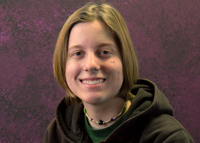|
|
Sources: Jackie Johnson, jmj27431@k-state.edu.edu;
and Christer Aakeroy, 785-532-6096, aakeroy@k-state.edu
Photo available. Contact media@k-state.edu or 785-532-6415.
Video available: http://www.k-state.edu/media/audio/podcasts/devscholars.mov and
http://www.k-state.edu/media/audio/podcasts/gordon2.mov
Download information available at http://www.k-state.edu/media/audio/podcastindex.html
News release prepared by: Kristin Hodges, 785-532-6415, khodges2@k-state.edu
Monday, Jan. 5, 2009
K-STATE STUDENT RESEARCHES CHEMICAL COMPOUNDS TO IMPROVE PERFORMANCE OF ANTICANCER DRUGS
MANHATTAN -- Many potentially useful anticancer drugs never reach their full capability due to poor solubility and stability, but a Kansas State University student is researching compounds that could help improve the drugs' delivery and efficacy.

Jackie Johnson, junior in pre-professional secondary education and chemistry, Overland Park, is researching how to improve anticancer drugs by altering the physical properties of active pharmaceutical ingredients, or APIs, used in the manufacturing of a wide array of therapeutic drugs.
To alter the APIs, Johnson is combining molecules in a controlled environment such that new crystalline forms become available to drugs, which enhance many of the drugs' key properties.
"The wide impact of what we're doing -- I think that's really cool," Johnson said. "Who wouldn't want to be a part of something like that -- something that could change so many people's lives, something so cutting edge. It's really a very, very exciting thing."
Johnson is working with Christer Aakeroy, professor of chemistry at K-State, on a project that started at the end of the spring 2008 semester. In Aakeroy's lab, Johnson began the project by designing and synthesizing a small library of new compounds and using them as a testing ground for interactions and communication between molecules.
Johnson's project involves preparing co-crystals, a fundamentally new way of improving cancer drugs -- such as improving their ability to dissolve in the body and their shelf life without changing the actual compounds that help the body. To form co-crystals, two molecules bond in a loose interaction: one being the API that helps the human body, and the other is the non-pharmaceutical molecule, which changes the way the API binds to itself, affecting the compound's physical characteristics like solubility and thermal stability.
Johnson is examining molecules to better predict how they will bind and how it will affect the cancer drugs' characteristics. She said if research can predict how certain combinations react, literature could be created so that pharmaceutical companies could refer to it to find exactly what they should add to a compound to receive specific goals, like increasing shelf life.
Johnson said the project is ongoing, though her goal is to publish a paper on her findings by the end of the spring 2009 semester. She also is working on two other papers from previous research projects, which will give her three possibilities to potentially publish her findings in international peer-reviewed journals.
"One of Jackie's best assets as a scientist is a very analytical mind," Aakeroy said. "She quickly grasps key concepts, incorporates them with her own know-how and expertise, and develops new questions, ideas and hypotheses in a very impressive manner. She also is an excellent communicator. I think she has a real passion both for new science and for teaching, and I have no doubt that she will be able to combine those components into a very successful career."
Though she has thoroughly enjoyed chemistry research, Johnson is undecided in her career path. She would like to be a high school chemistry teacher, but she said more experience in both education and research would help to decide her future.
Johnson was involved in a EUREKA research project in Dublin, Ireland, for two months in summer 2008 with Silvia Giordani, research lecturer at Trinity College Dublin. The project was funded by the Science Foundation of Ireland. She also has received a Cancer Research Award from K-State's Terry C. Johnson Center for Basic Cancer Research, and some support from the American Chemical Society-Petroleum Research Fund.
Johnson is a chemistry tutor for K-State's Academic Resource Centers and a member of Alpha Chi Sigma, the professional chemistry fraternity. A 2007 graduate of Olathe North High School, she is the daughter of Tim and Cathy Johnson, Overland Park.